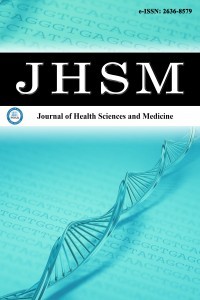Is hyperlipazemia a poor prognostic factor in patients with COVID-19 ?
Introduction: COVID-19 disease may pose a considerable health threat to healthy individuals and individuals with comorbidity. The SARS-CoV-2 virus affects the respiratory tract and may cause damage to the pancreas by binding to the ACE-2 receptor in the pancreas. In our study, we investigated the effects of hyperlipasemia on morbidity and mortality in patients diagnosed with COVID-19.
Material and Method: In this study, 2350 patients diagnosed with COVID-19 between November 2020 and December 2020 were retrospectively reviewed. Other possible causes of hyperlipasemia were excluded. Hyperlipasemia secondary to COVID-19 was detected in 338 patients. These patients were divided into two groups based on their lipase elevation rates.
Results: Hyperlipasemia was detected in 14.4% of the patients diagnosed with COVID-19, and severe hyperlipasemia (>3x) was detected in 2.3%. The mean age of the patients was 64±13.8 (18-92), of which 59.5% (201) were male. In our study, 24 patients (1%) were diagnosed with acute pancreatitis. When compared according to lipase level, a significant difference was found between the groups regarding the history of HT, CCI score, development of ARF at follow-up, development of ARDS, need for ICU hospitalization, need for intubation, length of stay in ICU, and death rates. A weak correlation was found in the correlation analysis between hyperlipasemia and ARDS development and mortality.
Conclusion: Elevated lipase levels were associated with poor prognosis and mortality in patients with COVID-19 infection.
Keywords:
SARS-CoV-2 hyperlipasemia, COVID-19, pancreatitis, viral pancreatitis,
___
- Akkus C, Yilmaz H, Mizrak S, Adibelli Z, Akdas O, Duran C. Development of pancreatic injuries in the course of COVID-19. Acta Gastroenterol Belg 2020; 83: 585-92.
- Li LQ, Huang T, Wang YQ, et al. COVID-19 patients' clinical characteristics, discharge rate, and fatality rate of meta-analysis. J Med Virol 2020; 92: 577-83.
- https://www.who.int/publications/m/item/weekly-epidemiological-update-on-covid-19---24-august-2021.
- Sinonquel P, Aerts M, Badaoui A, et al. BSGIE survey on COVID-19 and gastrointestinal endoscopy in Belgium: results and recommendations. Acta Gastroenterol Belg 2020; 83: 344-54.
- Vege SS. Acute pancreatitis. Feldman M, Friedman LS, Brand LJ (editors). In: Sleisenger and Fordtran’s gastrointestinal and liver disease, Eleventh Edition, Chapter 58, p: 893-916.
- Mazrouei SSA, Saeed GA, Al Helali AA. COVID-19-associated acute pancreatitis: a rare cause of acute abdomen. Radiol Case Rep 2020; 15: 1601-3.
- Liu F, Long X, Zhang B, Zhang W, Chen X, Zhang Z. ACE2 expression in pancreas may cause pancreatic damage after SARS-CoV-2 infection. Clin Gastroenterol Hepatol 2020; 18: 2128-30.e2.
- Banks PA, Bollen TL, Dervenis C, et al. Acute Pancreatitis Classification Working Group. Classification of acute pancreatitis--2012: revision of the Atlanta classification and definitions by international consensus. Gut 2013; 62: 102-11.
- Wang F, Wang H, Fan J, Zhang Y, Wang H, Zhao Q. Pancreatic injury patterns in patients with COVID-19 pneumonia. Gastroenterology 2020; 159: 367e70
- Rasch S, Herner A, Schmid RM, Huber W, Lahmer T. High lipasemia is frequent in COVID-19 associated acute respiratory distress syndrome. Pancreatology 2021; 21: 306-11.
- McNabb-Baltar J, Jin DX, Grover AS, et al. Lipase Elevation in Patients with COVID-19. Am J Gastroenterol 2020; 115: 1286-8.
- Berk JE, Shimamura J, Fridhandler L. Amylase changes in disorders of the lung. Gastroenterology 1978; 74: 1313e7
- Pieper-Bigelow C, Strocchi A, Levitt MD. Where does serum amylase come from and where does it go? Gastroenterol Clin N Am 1990; 19: 793e810.
- Hameed AM, Lam VW, Pleass HC. Significant elevations of serum lipase not caused by pancreatitis: a systematic review. HP 2015; 17: 99e112
- Zerem E. Treatment of severe acute pancreatitis and its complications. World J Gastroentero 2014 20: 13879-92
- Rawla P, Bandaru SS, Vellipuram AR. Review of infectious etiology of acute pancreatitis. Gastroenterol Res 2017; 10: 153-8.
- de-Madaria E, Siau K, Cardenas-Jaen K. Increased amylase and lipase in patients with COVID-19 pneumonia: Don’t blame the pancreas just yet! Gastroenterology 2020. [Epub ahead of print April 21 2020.
- Thaweerat W. Current evidence on pancreatic involvement in SARSCoV- 2 infection. Pancreatology 2020; 20: 1013-4.
- Barlass U, Wiliams B, Dhana K, et al. Marked elevation of lipase in COVID-19 Disease: a cohort study. Clin Transl Gastroenterol 2020; 11: e00215.
- Dalan R, Bornstein SR, El-Armouche A, et al. The ACE-2 in COVID-19: Foe or Friend?Horm Metab Re 2020; 52: 257-63.
- Chen Z-GZ, You D. Influencing factors of pancreatic microcirculatory impairment in acute panceatitis. World J Gastroenterol 2002; 8: 406-12.
- Cheung S, Fuentes AD, Fetterman AD. Recurrent acute pancreatitis in a patient with COVID-19 Infection. Am J Case Rep 2020; 21: e927076.
- Patnaik RNK, Gogia A, Kakar A. Acute pancreatic injury induced by COVID-19. IDCases 2020; 10: e00959.
- Szatmary P, Arora A, Raraty MGT, Dunne DFJ, Baron RD, Halloran CM. Emerging phenotype of severe acute respiratory syndrome-Coronavirus 2-associated pancreatitis. Gastroenterology 2020; 159: 1551-4.
- Suchman K, Raphael KL, Liu Y, Wee D, Trindade AJ. Northwell COVID-19 Research Consortium. Acute pancreatitis in children hospitalized with COVID-19. Pancreatology 2021; 21: 31-3.
- Lax SF, Skok K, Zechner P, et al. Pulmonary arterial thrombosis in covid-19 with fatal outcome : results from a prospective, single-center, clinicopathologic case series. Ann Intern Med 2020; 173: 350e61.
- Yayın Aralığı: Yılda 6 Sayı
- Başlangıç: 2018
- Yayıncı: MediHealth Academy Yayıncılık
Sayıdaki Diğer Makaleler
Okan BARDAKCI, Murat DAŞ, Hilal ŞEHİTOĞLU, Ece ÜNAL ÇETİN, Ünzile ATALAY, Uğur KÜÇÜK, Fatih KAMIŞ, Alpaslan TANOĞLU, Yavuz BEYAZIT
Kenan ERDEM, Ipek DUMAN, Muhammet KIZMAZ, Tevfik Fikret İLGENLİ
Hüsnü BAYKAL, Ayşe Füsun ÜLGER
İhsan KAPLAN, Canan CAN, Halil KÖMEK, Ferat KEPENEK, Hikmet SOYLU, Erkan ERDUR, Nurşin AGÜLOĞLU, Cihan GÜNDOĞAN
Selda ÇELİK DÜLGER, Mehmet ÇITIRIK, Esra BAHADİR CAMGOZ, Mehmet Yasin TEKE
Ercan TÜRKMEN, Mahmut ALTINDAL, Ferah TARAN, Tuba KURUOĞLU, Aydın DEVECİ, Melih AKPUNAR, Seyyid Bilal AÇIKGÖZ, Nurhan KÖKSAL
Ahmet Hikmet ŞAHİN, Murat Sabri YILMAZ
Hicran ŞİRİNOĞLU, Savaş ÖZDEMİR, Oya GÖKÇER, Simten GENÇ, Cagdas Nurettin EMEKLİOGLU, Enis ÖZKAYA
